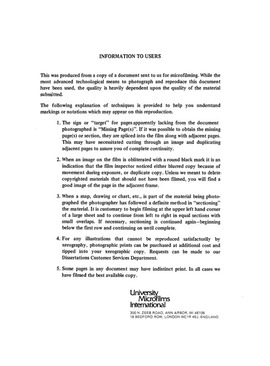| dc.contributor.author | Burdick, Dana Ruth Collins, | en_US |
| dc.date.accessioned | 2013-08-16T12:28:14Z | |
| dc.date.available | 2013-08-16T12:28:14Z | |
| dc.date.issued | 1980 | en_US |
| dc.identifier.uri | https://hdl.handle.net/11244/4788 | |
| dc.description.abstract | The primary purpose of this study was to determine the factors that influenced various drinking patterns. The population consisted of 114 men. | en_US |
| dc.description.abstract | This study found differences in interpersonal needs among the three drinking groups studied. The Rotter and DRIE indicated that all groups scored in an internal direction suggesting that I-E directionality does not predict drinking behaviors. The Control factor was significantly lower on the FIRO-B among all three groups. The interaction of the other factors on the FIRO-B indicate that the need for Inclusion and Affection varies within the groups. This information suggests that the consumption of alcohol is influenced in accordance with the degree of needs, as measured by this instrument. | en_US |
| dc.description.abstract | The data were analyzed using Analysis of Variance. The study found that Abusive Drinkers, Non-Abusive Drinkers, and Non-Drinkers all scored within an internal direction on Rotter's I-E Scale with the Non-Abusive Drinkers tending toward a more external direction. This population also scored within an internal direction on the DRIE Scale with the Abusive Drinkers tending to score toward a more external direction. The FIRO-B data indicated that the Abusive Drinkers had lower scores in all areas. Combining the Expressed and Wanted dimensions, similar patterns emerged among the three drinking conditions. Affection, Inclusion, and Control scores were in a descending order with the Control score being significantly smaller than the other two scores. The Expressed dimension reveals similar patterns for the Abusive and Non-Abusive drinking groups with little variation between Inclusion and Affection but the Control score was significantly lower. The Non-Drinking group had higher scores in the area of Control and identical mean scores for Inclusion and Affection. The Wanted dimension indicated lower total mean scores in Control for all drinking groups with Inclusion and Affection following in ascending order. The score for Wanted Affection is significantly greater than the other scores. The Non-Abusive drinking group had the greatest variability among the three scores and the Abusive drinking group had the least variability. In both the Expressed and Wanted dimensions, the Non-Abusive drinkers had the highest total mean scores whereas the Abusive drinkers had the lowest total mean scores. Between the two dimensions and among the three areas assessed, the scores are lower in Wanted Inclusion and Control and higher in Wanted Affection. | en_US |
| dc.description.abstract | For purposes of this investigation, an abusive drinker was defined as an individual who was arrested and determined by the court to be intoxicated. Non-abusive drinking was defined as moderately drinking not more than three (3) times a week and never having been arrested for intoxicated behavior. A questionnaire designed by John Hopkins Hospital was further used to screen for individuals who might tend to be abusive drinkers. Non-drinkers were defined as those who do not consume alcohol. Instruments used in this study were Rotter's Internal-External Locus of Control Scale, Drinking Related Internal-External Scale (DRIE), and Fundamental Interpersonal Relationship Orientation (FIRO-B) Scale. One score is obtained from each of the Rotter and DRIE Scales while six scores are obtained from the FIRO-B Scale. The FIRO-B Scale reports a Wanted and Expressed dimension in three areas: Inclusion, Control, and Affection. | en_US |
| dc.format.extent | viii, 69 leaves ; | en_US |
| dc.subject | Education, Educational Psychology. | en_US |
| dc.title | A study of interpersonal factors influencing drinking patterns among abusive drinkers, non-abusive drinkers, and non-drinkers of alcohol. | en_US |
| dc.type | Thesis | en_US |
| dc.thesis.degree | Ph.D. | en_US |
| dc.thesis.degreeDiscipline | Jeannine Rainbolt College of Education | en_US |
| dc.note | Source: Dissertation Abstracts International, Volume: 41-07, Section: A, page: 3004. | en_US |
| ou.identifier | (UMI)AAI8101507 | en_US |
| ou.group | Jeannine Rainbolt College of Education | |
